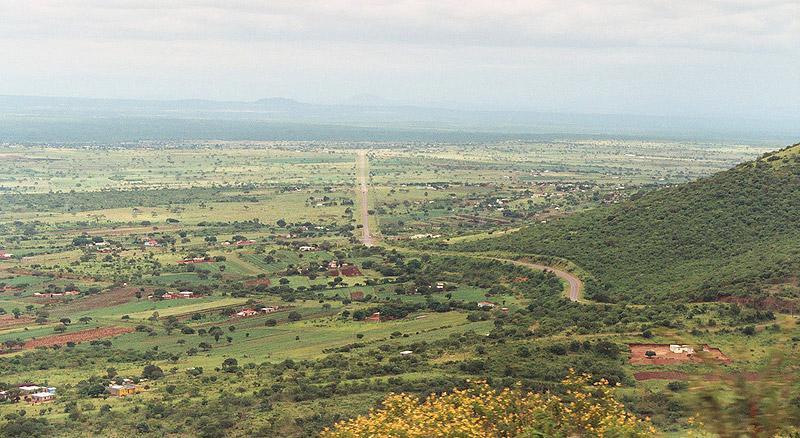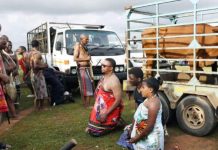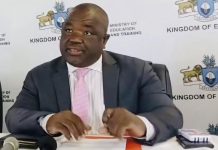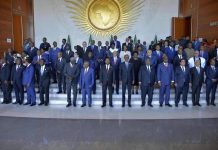Africa-Press – Eswatini. In a non-political issue, one would have not expected partisans to invade Mbondzeni Farm in the Shiselweni Region.
Their involvement in a matter that did not affect their manifesto in anyway, turned the situation higgledy-piggledy and, of course, frighteningly explosive.
Mbondzeni is a private farm that is owned by a citizen who happens to be a businessman. The farm owner is not even a high profile citizen or an active player in the country’s political space. He is not a decision maker.
Therefore, I had not expected any of the political parties to get involved in such a matter, which courts and tribunals would have efficiently handled.
At the time of preparing this analysis, Vukani Mkhwanazi, the security guard at Mbondzeni Farm, was still missing.
According to the May 23, 2024 edition of the Times of Eswatini, two suspects took police deep into the forest, where clothes believed Mkhwanazi was wearing at the time of his mysterious disappearance were found.
The Times of Eswatini spoke to credible sources who revealed that the security guard, on the day he was last seen, set out to look for look for livestock within the farm boundaries and accidentally came across unknown people believed to be members of political parties. Two other suspects are still at large. We have credible information that the suspects who are still at large are members of an extreme political party.
Violence
Secondly, it is an indisputable veracity that the dispute was hyped by the involvement of certain members of these political parties. Violence erupted and people got injured. Disappointingly, a dispute between a private farm owner and dwellers or squatters had to become a national issue. It is evident that the levels of desperation and opportunism in the political space are very high.
Ordinarily, in such a situation, it is clear to all that the bank of contemporary political ideas has collapsed. Where ideas to effectively influence national political thinking are noticeably diminishing, opportunists hijack situations.
This country needs serious agenda-setting minds that put a persuasive philosophy on the table for both liberals and conservatives to appreciate and embrace for validity and genuine critiquing.
It is very disappointing to see advocates of western democracy painting a bad picture of a political system that has developed many countries across the globe. Their attitude, deeds or modus operandi are not helping them scoring points for multiparty democracy. I have often said and I still maintain that there is nothing untoward multiparty democracy. There is absolutely nothing wrong about this system of government.
The problem with the advocacy in Eswatini is that it is in the wrong hands. I am interested in knowing how multiparty democracy can assist the country in its development agenda, but I cannot learn from those who invaded the Mbondzeni Farm. Last year, I did address the land tenure system in the country. I pointed to the fact that it needs an urgent review. However, it cannot be reviewed through illegal grabbing and occupation of private farms.
In a private farm, if you know you are squatter, you just have to negotiate with the owner. Ask him to, at least, sell part of the property to you or look for another land to set up a structure. That you have been the occupant of the farm since 1906 does not change the farm into an Eswatini Nation Land. I doubt that government would not have assisted victim of circumstances.
In my own definition, victim of circumstances are the people who occupied farms on the basis of an illegal khonta arrangement endorsed by chiefdom authorities.I want to believe we have a government that is aware that globalisation does not favour statelessness. The United Nations frowns upon situations in which some of our people around the world become landless.
Negotiate
I am pretty sure government would have assisted the people of Mbondzeni to acquire another property. In such situations, I urge government to negotiate with the private property owners to sell part of the farms. Government must also buy farms, and there are lots of them that are on sale. People can then relocate to these farms. I must mention here that I am fully aware of what transpired when the Mbondzeni Farm dispute began.
An online media platform alleged that the farm dwellers were being evicted by a businessman from Taiwan.
Ladies and gentlemen, this kind of journalism that is perpetuated by the online media is sometimes tragic – highly suicidal. After a series of publication of articles on the ownership of the farm, I personally became angry with the so called Taiwanese businessman, only to find out later that the farm is factually owned by a citizen.
The articles, as a matter of fact, caused members of political parties to invade Mbondzeni Farm to fight the so called Taiwanese businessman. At the height of the fracas, the ownership of the farm shifted from the so called Taiwanese businessperson to the country itself, Taiwan. Again, this fuelled speculations that if Taipei was involved, it meant Mbabane should answer, hence the invasion of the farm by members of the pressure groups.
The question is; if you are a member of an institution, why didn’t you search for facts before the farm invasion?
One would then ask: “Are they ready to govern?” Despite its several benefits, emaSwati will gradually close doors to any person advocating for multiparty system of government, not because it is wicked, but certain elements within it are seemingly hell bent on besmirching its integrity, thus rendering its legitimacy vulnerable to unnecessary questioning and scepticism.
Contextually, multiparty democracy is not a new political concept to Eswatini. Political parties led the country to independence in 1968. They were banned on the basis of the April 12, 1973 King’s Proclamation. They existed and participated in the formation of government. We are all aware that King Sobhuza II formed or played a leading role in the establishment of a political party known as Imbokodvo. Safely saying, the Royal Palace formed a political party and the person behind it was King Sobhuza II.
Appreciate
We have to then appreciate the fact that multiparty democracy has been the kingdom’s system of governance until the passage of the King’s Proclamation. To put it differently, it is a tried and tested political system in the monarchy.
Eswatini is an ally of countries that are governed by political parties. Our first largest trading partner, South Africa, is a multiparty democratic State.
We have seen how governments led by political parties improved the welfare of their people. The kingdom has secured loans from political party-administered countries. I want to put it to the advocates that their conduct should not taint the good image of multiparty democracy. I am sure that Mkhwanazi would be with his family if political parties were not involved in the Mbondzeni Farm dispute.
Mind you, Mkhwanazi is related to some of the farm dwellers whom the political parties supposedly came to defend.
On another note, one of our readers is addressing this highly disturbing global issue about Dolkun Isa.
Why silence on Dolkun Isa’s confession? Dolkun Isa is the leader of the World Uyghur Congress, he has very recently, through his X account, apologised for his conduct towards not one, but several female employees. He has also blocked one of the female employees who raised the issue in the public forum.
The timeline of the entire event is very strange, as is the entire story itself, but it most certainly should be something that attracts global attention. Strangely, global attention is diverted away from anything that might shed a negative light on allegations of such a terrible topic as genocide – yes you read that right – the fact that one of the world’s leading proponents of a genocide in China has been caught engaging in, admitted to and apologised for his bad behaviour towards female employees and a search on Google presents no information about this story.
We can be assured that if there was such a story related to a Chinese official, it would be all over Western media, but against a man, according to Wikipedia, is designated by China as an international terrorist, it seems everything is fair play. The World Uyghur Congress has issued a statement and they have expressed concern as well as acknowledged and welcomed Isa’s forthright apology.
They have, however, not suspended him, nor have they asked for his reservation, but here’s the most amazing thing: The statement was issued on May 13 and, more than 24 hours later, not a single mainstream media outlet has picked it up. It’s not that they might have missed it as it’s all over X, where they usually scroll for their news items, particularly those that are anti-China, anti-Russia or reflect any US adversary in a negative light.
Allegations
But so far, several days after the allegations came to light, several days after the published apology and one day after the statement, but the is not a word in the mainstream media. But let’s get something straight, this it is not Gaza we are talking about, this is a US fabricated genocide, where not a single dead body has been seen, there are no mutilated children to be found, no photo or video evidence, not even a proven witness statement has been produced as evidence, corroborated and challenged this as a fake genocide as is possible to find and Mr Isa is a necessary cog in the wheels of misinformation.
Coincidentally, within a day of Dolkun Isa’s misbehaviour coming to light, and the same day as the World Uyghur Congress issued their statement on the matter, one of Isa’s acolytes, Timothy Grose, an associate professor of China Studies and supporter of the Uyghur genocide narrative, has released a report suggesting that the poor people of Xinjiang are being forced to cook and eat Han type of food and their own cuisine is being denied to them.
I’ve drunk their tea, eaten their dried fruit, drank their wine and even their beer (Wusu, it’s quite nice) and had many conversations with many of them. I’ve seen them dance, heard them sing and listened to their music, but here’s the amazing thing, I don’t need to go to Xinjiang to do this.
Source: times
For More News And Analysis About Eswatini Follow Africa-Press







